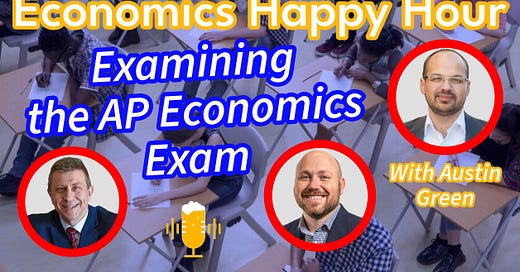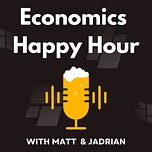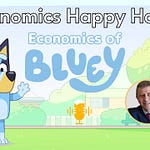How much do you know about the AP Economics exam? We doubt you know as much about it as Austin Green, award-winning Georgia AP Economics instructor and AP exam grader. Austin joins us to share insights into teaching AP Economics and his experience grading AP exams. Teaching the course involves covering a broad range of economic concepts, often requiring instructors to balance depth and breadth in their curriculum. It’s challenging to prepare students for the exam because it demands both conceptual understanding and the ability to apply economic principles to real-world scenarios. It turns out that grading those AP exams is pretty meticulous work, too.
In this episode, we discuss:
Balancing depth and breadth in covering economic principles.
Strategies for preparing students for the AP Economics exam.
Insights into the meticulous process of grading AP exams.
Austin's reflections on the rewards and challenges of teaching AP Economics.
And a whole lot more!
Catch up on some old episodes:
You can also listen to us on Google Podcasts, TuneIn Radio, and Apple Podcasts. If one of these is your go-to podcast service, be sure to rate us and subscribe!
Watch this episode on YouTube:
Some show notes:
This was our fourth and final recording at Pour Taproom in Midtown Atlanta, following the Conference on Teaching and Research in Economic Education held nearby. In this episode, we were joined by Austin Green who teaches at Milton High School outside of Atlanta, Georgia. Austin was named the 2023 Economics Teacher of the Year by the Georgia Council on Economics Education.
Austin joined us to discuss his experience teaching AP Economics and grading the AP Economics exam each summer. But before diving into the conversation, they enjoyed a refreshing drink together. Jadrian chose Garden Beer #15, a sour hefeweizen. Interestingly, we caught Austin in the middle of a 75-day cleanse. Luckily, the taproom offered mocktails so Austin was able to get a pina colada mocktail for today’s recording. Matt broke his string of local beers by going for a Brooklyn Lager, which he’d never had before.
We were excited for Austin to join us because he is an award-winning educator in the state of Georgia because of his active learning activities in his classroom. Austin shared some of his favorites in this episode, including having students compete in a food-eating competition to highlight diminishing returns and singing karaoke to teach supply theory. That’s the sort of student engagement that makes it easier for him to teach economics to a bunch of high school students.
The AP curriculum is designed to mirror a principles-level college course, which means it can cover many topics that many universities don’t even teach in their programs. As a result, teachers are faced with the challenge of striking the right balance between covering a long list of concepts and ensuring students understand those concepts at a deep level. Students can’t just memorize those concepts, but instead actually understand the underlying principles. Austin shares his frustrating topics and the challenges of covering all that material in a way that students will be able to retain it months later when the AP exam rolls around.
Austin also provides listeners with an insider’s view into the meticulous grading process for AP exams. It involves trained educators evaluating thousands of exams under strict guidelines to ensure students are marked equitably across graders. He explained how exam responses are scored based on specific rubrics designed to assess students' understanding and application of economic principles.
Austin emphasized the dedication and expertise required of AP exam graders, who play a crucial role in maintaining the exam's reliability and fairness. This insight into the grading process offered listeners a deeper understanding of how student performance is evaluated on a national scale. If you’re curious about how the 2024 test takers performed, you can learn about it directly from Trevor Packer, head of the AP program:
Before wrapping up, we had to give a shoutout to Austin for his exceptional article published last year in the , where he details how he engages students by role-playing fiscal policy responses to the COVID-19 pandemic. If you're an economics educator looking for innovative ways to incorporate active learning into your fiscal policy lessons, Austin’s assignment is a must-see:
Austin concluded the episode with insightful advice not only for educators returning to school but for anyone planning for the months ahead. He shared a quote from C.S. Lewis that emphasizes prioritizing what's most important to ensure that everything else falls into place:
Put first things first and we get second things thrown in: put second things first & we lose both first and second things.
This week’s pop culture references:
Once Austin got his first publication, he was hooked on the process. He recently completed a fascinating project exploring how the hype around Taylor Swift can be leveraged for classroom teaching. Austin collaborated with Kelsey Halfen Dahlberg (Dulles High School), Signe DeWind (Francisco Marroquín University), Wayne Geerling (University of Texas at Austin), and G. Dirk Mateer (University of Texas at Austin) to develop lesson plans using Taylor Swift as a teaching example. Here’s Kelsey explaining her contribution:
Instead of focusing on Taylor Swift, Matt highlighted a scene from Game of Thrones where Tyrion Lannister discusses the harsh realities of leadership and the need for brutality to maintain control. This scene prompts a discussion on the distinction between 'what is' and 'what ought to be,' offering educators a valuable opportunity to explore normative versus positive statements.
Thanks for reading - please give a 5-star review on your favorite podcast provider to help us grow our audience!





















Share this post